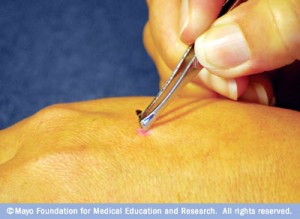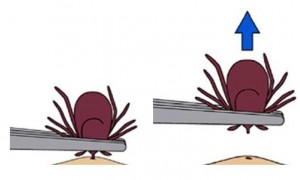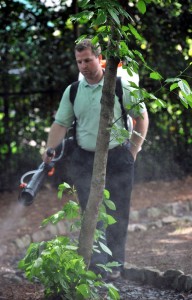READY TO GET STARTED?
REQUEST A FREE ESTIMATE
Fill out the form below or call (888) 466-7849 for a free, no-obligation estimate.
Yellow jackets have barbed like pointers on their stinger that cause the stinger to get lodged into the skin. The stinger is usually left behind, along with the venom sac. It is important to remove a stinger as quickly as possible because venom can continue to be released even if it’s not attached to the bee. The venom can cause an allergic reaction or a possible infection.

Source: Mayo Clinic
Symptoms of infection include:
Consult your Doctor immediately if any of these symptoms occur.
Symptoms of an allergic reaction include:
Consult your Doctor immediately at signs of an allergic reaction.
What to do if stung:
It’s very important to call a pest professional if you believe a yellow jacket nest is near your property. We DO NOT recommend you try to remove this on your own…this could result in being stung.
For yellow jacket removal, wasp removal, and hornet removal, call the professionals at Northwest Exterminating.
Other blogs: How to Treat a Yellow Jacket Sting
PestWorld.org and The Asthma and Allergy Foundation of America have teamed up for a public service announcement to warn homeowner’s of the dangers of allergens in the home caused by pests and rodents. Common household pests such as cockroaches and mice are responsible for inciting allergies and aggravating asthma. In fact, 63% of homes contain cockroach allergens. That number increases to 78%-98% in urban areas. 82% of homes have asthma triggers spread by mice.
Watch NPMA’s public service announcement below:
Keep your family (children are especially at risk) and home safe by keeping your home pest free, call Northwest Exterminating. For more information visit pestworld.org or The Asthma and Allergy Foundation of America.
The NPMA will donate $1 to The AAFA for each new Facebook LIKE (HERE) until Sept, 15th. Go LIKE them…and LIKE Northwest Exterminating (HERE) while you’re there!
PestWorld.org and The Asthma and Allergy Foundation of America have teamed up for a public service announcement to warn homeowner’s of the dangers of allergens in the home caused by pests and rodents. Common household pests such as cockroaches and mice are responsible for inciting allergies and aggravating asthma. In fact, 63% of homes contain cockroach allergens. That number increases to 78%-98% in urban areas. 82% of homes have asthma triggers spread by mice.
Watch NPMA’s public service announcement below:
Keep your family (children are especially at risk) and home safe by keeping your home pest free, call Northwest Exterminating. For more information visit pestworld.org or The Asthma and Allergy Foundation of America.
The NPMA will donate $1 to The AAFA for each new Facebook LIKE (HERE) until Sept, 15th. Go LIKE them…and LIKE Northwest Exterminating (HERE) while you’re there!
SOURCE
According to new information gathered by the CDC the number of lyme disease cases is 10 times higher than the 30,000 cases each year that has previously been reported. Because not every case is reported, recent efforts have uncovered that the number of lyme disease cases is about 300,000 each year. The CDC is conducting 3 complimentary studies to improve their count of lyme disease cases.

How to Properly Remove a Tick
Source
To prevent tick bites:
For more information on Lyme disease visit the CDC.
For more information on how to control ticks visit Northwest Exterminating.

Northwest Exterminating representative, Courtesy of AJC
Need tips on how to keep mosquitoes away?
These are just a few tips on keeping mosquitoes away. Mosquitoes are known carriers of diseases like West Nile virus, encephalitis, and heartworms in dogs. Make sure that you are protecting yourself and your loved ones. For more information, visit our blog or call Northwest Exterminating at 888.466.7849.
Why Do Mosquitoes Love Me So Much?